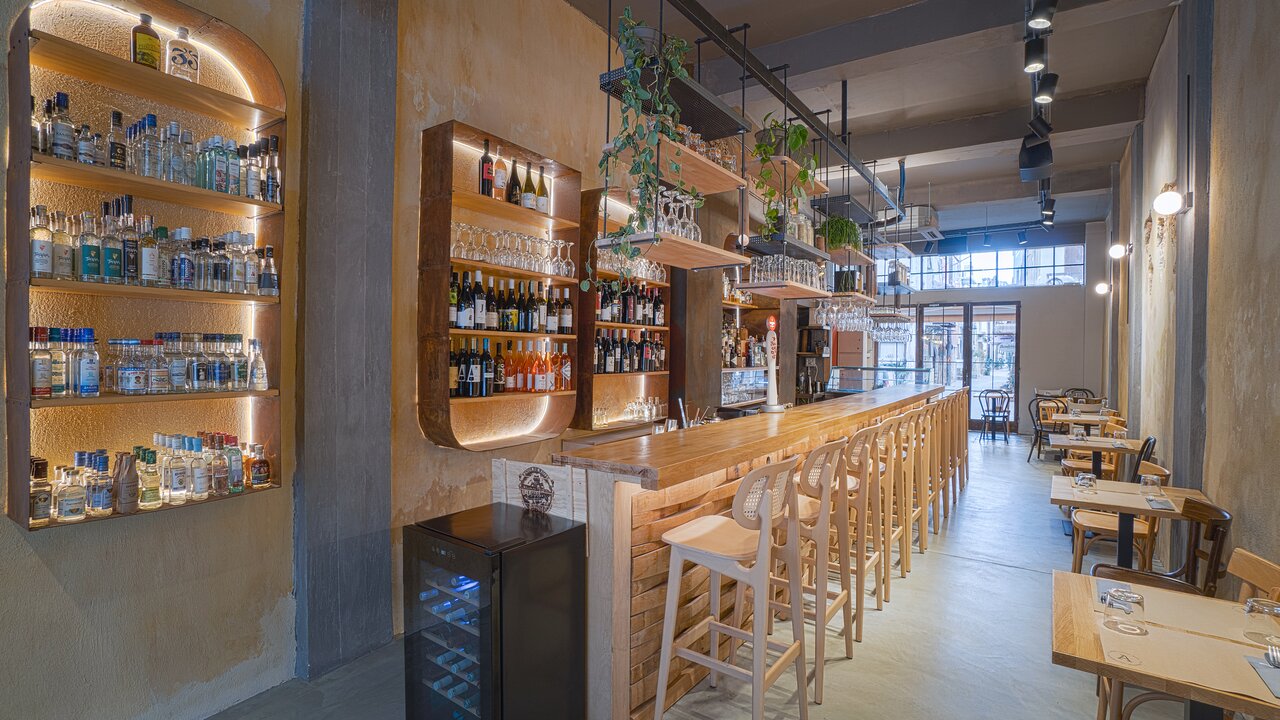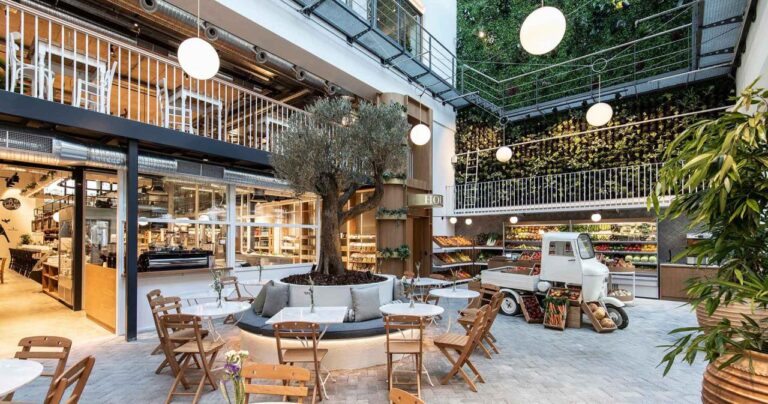In an age where travel is as much about experiencing local flavors as it is about sightseeing, foodie hotels have emerged as a distinct and highly sought-after category within the hospitality industry. These establishments go far beyond offering a mere meal; they curate immersive culinary journeys, transforming a stay into an unforgettable gastronomic adventure. For discerning travelers whose itineraries revolve around exceptional dining, unique food experiences, and a deep dive into local culinary traditions, a foodie hotel is the ultimate destination. This comprehensive article delves into what defines these gastronomic havens, the diverse array of culinary experiences they provide, their profound impact on local food economies, and the exciting future that lies ahead for this delicious fusion of travel and taste.
The Defining Characteristics of a Foodie Hotel

A true foodie hotel makes gastronomy its central pillar, weaving exceptional dining experiences and culinary exploration into the very fabric of the guest’s stay. It’s an environment where food is not just sustenance, but an art form and a key element of the cultural experience.
A. Exceptional On-Site Dining Establishments
The cornerstone of any foodie hotel is its exceptional on-site dining establishments. This often includes:
A. Michelin-Starred or Award-Winning Restaurants: Many top foodie hotels house restaurants recognized by prestigious culinary guides, attracting both hotel guests and local gourmands. These typically offer innovative menus, refined service, and extensive wine lists.
B. Diverse Culinary Concepts: Beyond a single flagship restaurant, foodie hotels often feature a variety of dining concepts, from casual bistros and vibrant rooftop bars to specialized dessert lounges or authentic regional eateries. This diversity caters to different moods and preferences.
C. Signature Chefs and Culinary Teams: The presence of renowned chefs, often with distinct culinary philosophies, and highly skilled culinary teams is a major draw. These chefs frequently engage with guests, offering a more personal touch.
D. Impeccable Service and Ambiance: Dining experiences are elevated by attentive, knowledgeable service staff and thoughtfully designed dining spaces that create a memorable atmosphere, whether it’s an elegant fine-dining room or a lively open kitchen.
The quality and variety of the culinary offerings define the hotel’s gastronomic prowess.
B. Emphasis on Local, Seasonal, and Sustainable Sourcing
Foodie hotels often place a strong emphasis on local, seasonal, and sustainable sourcing. This commitment benefits both the guest experience and the environment.
A. Farm-to-Table Philosophy: Prioritizing ingredients from nearby farms, fisheries, and artisanal producers, ensuring freshness, quality, and support for the local economy. Many hotels even have their own on-site gardens or farms.
B. Seasonal Menus: Menus are designed to reflect the bounty of each season, guaranteeing that dishes are made with ingredients at their peak flavor.
C. Sustainable Practices: Adhering to ethical sourcing (e.g., sustainably caught seafood, humanely raised meats), minimizing food waste, and often composting organic materials.
D. Transparency: Guests are often informed about the origin of their food, connecting them more deeply with the local culinary ecosystem.
This dedication to responsible sourcing elevates the taste and integrity of the cuisine.
C. Immersive Culinary Experiences and Activities
Beyond merely serving meals, foodie hotels curate a range of immersive culinary experiences and activities that engage guests more deeply.
A. Cooking Classes: Hands-on classes taught by hotel chefs, focusing on local cuisine, specific techniques, or international dishes. These often include market visits to select fresh ingredients.
B. Wine and Spirit Tastings: Guided sessions led by sommeliers or mixologists, exploring local wines, craft beers, or unique spirits, sometimes paired with small bites.
C. Chef’s Table Dinners: Exclusive, intimate dining experiences where guests sit in or near the kitchen, interacting directly with the chef as dishes are prepared and served.
D. Food Tours and Excursions: Organized trips to local markets, vineyards, cheese makers, or olive groves, offering a behind-the-scenes look at food production.
E. Themed Culinary Events: Hosting special gastronomic weekends, seasonal food festivals, or collaborations with guest chefs.
These activities turn dining into an educational and interactive journey.
D. Thoughtful In-Room Dining and Minibar Offerings
The culinary focus extends to the privacy of the guest room, with thoughtful in-room dining and minibar offerings that reflect the hotel’s gastronomic identity.
A. Gourmet Minibars: Stocked with artisanal snacks, local craft beverages, high-quality chocolates, and sometimes pre-batched cocktails from the hotel bar.
B. Specialized Room Service: Offering a more refined or locally-inspired room service menu, perhaps including chef-prepared meals or unique regional dishes not typically found on standard room service menus.
C. Welcome Amenities: Guests might find gourmet welcome treats, local delicacies, or a bottle of regional wine upon arrival, setting the tone for their foodie experience.
This attention to detail ensures that culinary excellence is accessible at all times.
E. Sommelier and Mixologist Expertise
Foodie hotels often boast dedicated sommelier and mixologist expertise, elevating the beverage program to match the quality of the food.
A. Extensive Wine Lists: Curated collections of local, regional, and international wines, often with rare or unique selections.
B. Expert Sommeliers: On hand to guide guests through wine pairings, recommend bottles based on preferences, and share knowledge about viticulture.
C. Innovative Cocktail Programs: Talented mixologists crafting unique cocktails using fresh, seasonal ingredients, house-made infusions, and local spirits.
D. Coffee Culture: Emphasis on high-quality coffee, with skilled baristas and often locally roasted beans.
These beverage programs are an integral part of the overall gastronomic experience, creating perfect pairings and delightful discoveries.
The Evolution of Culinary-Centric Hospitality
The emphasis on food in hotels has matured significantly, moving from a mere necessity to a primary driver of guest choice and brand identity.
A. From “Hotel Restaurant” to “Culinary Destination”
The perception of hotel dining has drastically changed. What was once seen as a convenience for guests, often with uninspired menus, has transformed into a “culinary destination” that competes with standalone restaurants. Hotels actively promote their chefs, unique concepts, and gastronomic events, drawing in local clientele as well as travelers. This shift acknowledges that food can be a primary motivator for travel.
B. Impact of Social Media and Food Blogging
The rise of social media platforms (Instagram, TikTok) and food blogging has profoundly impacted foodie hotels.
A. Visual Appeal: The highly visual nature of gourmet food and unique dining experiences makes them perfect for sharing online, leading to organic marketing and widespread visibility.
B. Influencer Marketing: Food bloggers and influencers are actively sought by hotels to showcase their culinary offerings to a broad audience, generating buzz and bookings.
C. Guest-Generated Content: Guests themselves become powerful marketers, sharing their dining experiences and unique dishes, creating authentic word-of-mouth recommendations.
This digital ecosystem has amplified the reach and desirability of foodie hotels.
C. Blending Global Trends with Local Authenticity
Modern foodie hotels expertly blend global culinary trends with local authenticity. They might feature international cooking techniques or popular dining styles (e.g., omakase, molecular gastronomy) but apply them to local ingredients and regional flavors, creating a unique fusion that appeals to a sophisticated palate while honoring the destination. This provides a balance of familiarity and discovery.
D. Technology for Enhanced Culinary Experience
Technology is increasingly being used to enhance the culinary experience within foodie hotels.
A. Digital Menus with Allergen Information: Tablets or QR codes providing interactive menus with detailed ingredient lists and allergen warnings.
B. Online Reservations Systems: Seamless booking for popular restaurants, often integrated with guest loyalty programs.
C. Personalized Dietary Profiles: Utilizing guest data to anticipate dietary restrictions or preferences, allowing chefs to proactively tailor meals.
D. Virtual Cooking Classes: Some hotels offer virtual cooking sessions led by their chefs, accessible to guests even after their stay, extending the culinary journey.
E. AI for Food Pairing Recommendations: Emerging AI tools might suggest personalized wine pairings or menu choices based on guest preferences and past dining history.
Technology supports personalization and convenience without overshadowing the gastronomic art.
E. Sustainable and Ethical Food Practices
Beyond sourcing, a commitment to sustainable and ethical food practices is becoming a defining characteristic. This includes:
A. Food Waste Reduction: Implementing smart systems to minimize waste from kitchens and buffets.
B. Composting Programs: Turning organic waste into compost for hotel gardens or local farms.
C. Ethical Labor Practices: Ensuring fair wages and good working conditions for all culinary staff, from chefs to dishwashers.
D. Animal Welfare: Sourcing from suppliers with high animal welfare standards.
This holistic approach reflects a growing consumer demand for responsible consumption and adds another layer of integrity to the culinary offerings.
The Economic and Societal Impact of Foodie Hotels

Foodie hotels are not just about delicious meals; they are powerful economic engines that support local communities, drive innovation, and elevate a destination’s appeal.
A. Boosting Local Food Economies
Foodie hotels significantly boost local food economies by:
A. Direct Sourcing: Creating demand for local farmers, fishermen, and artisanal producers, providing them with stable income and encouraging sustainable practices.
B. Promoting Local Products: Introducing guests to regional ingredients, wines, and specialty products, leading to increased sales for local businesses.
C. Supporting Local Employment: Creating jobs within the hotel’s F&B department and indirectly supporting jobs in the agricultural and supply sectors.
This creates a powerful multiplier effect within the local food system.
B. Enhancing Destination Branding and Tourism
A strong culinary scene, anchored by renowned foodie hotels, can significantly enhance a destination’s branding and tourism appeal.
A. Drawing “Food Tourism”: Attracting a dedicated segment of travelers who choose destinations primarily for their culinary offerings.
B. Media Attention: Generating positive media coverage and buzz for the destination’s food scene.
C. Elevating Reputation: Positioning the city or region as a top gastronomic hub, which benefits all tourism segments.
This culinary distinction can be a major competitive advantage in the global travel market.
C. Driving Culinary Innovation and Talent Development
The competitive nature of the foodie hotel scene drives constant culinary innovation and talent development.
A. Experimentation: Chefs are encouraged to experiment with new techniques, ingredients, and flavor combinations, pushing gastronomic boundaries.
B. Training and Mentorship: Hotels invest in training their culinary teams, often providing opportunities for young chefs to learn from masters, fostering the next generation of culinary talent.
C. Global Exchange: Attracting international culinary talent, leading to a rich exchange of ideas and techniques.
This continuous pursuit of excellence benefits the entire culinary industry.
D. Creating Cultural Bridges
Food is a universal language. Foodie hotels, by showcasing local cuisines and engaging guests in culinary traditions, help create cultural bridges. They allow visitors to connect with a destination’s heritage through its flavors, fostering deeper understanding and appreciation for different cultures. This sensory immersion is a powerful form of cultural exchange.
E. Supporting Food Education and Awareness
Many foodie hotels go beyond serving food to actively supporting food education and awareness. This might involve:
A. Workshops for Guests: Educating on sustainable eating, healthy cooking, or ingredient sourcing.
B. Community Programs: Partnering with local schools or organizations to teach children about healthy eating and the importance of local agriculture.
C. Showcasing Indigenous Foods: Highlighting and preserving traditional or indigenous food practices that might otherwise be forgotten.
This contributes to a more informed and appreciative food culture.
Choosing Your Perfect Foodie Hotel
Selecting the ideal foodie hotel involves more than just picking a property with a restaurant. It requires a discerning eye for culinary excellence and immersive experiences.
A. Research the Restaurants and Chefs Thoroughly
The most important step is to research the restaurants and chefs thoroughly.
A. Awards and Recognition: Look for Michelin stars, Gault & Millau ratings, or mentions in reputable food guides (e.g., World’s 50 Best Restaurants list).
B. Chef’s Philosophy: Understand the culinary vision of the lead chef. Is it innovative, traditional, or sustainable? Does it align with your preferences?
C. Menu Samples: Review sample menus online to get a sense of the cuisine style, ingredients, and pricing.
D. Guest Reviews: Pay close attention to reviews specifically about the dining experiences, not just general hotel comfort.
B. Evaluate the Culinary Experiences Offered
Beyond just dining, evaluate the culinary experiences offered.
A. Cooking Classes: Are there hands-on classes? What cuisines do they focus on?
B. Tastings: Are there wine, spirit, or local food tastings?
C. Tours: Do they offer excursions to local markets, farms, or vineyards?
D. Special Events: Check for any upcoming culinary festivals, guest chef collaborations, or themed dinners during your stay.
These interactive elements significantly enhance the foodie experience.
C. Consider the Emphasis on Local Sourcing
If farm-to-table or sustainable practices are important to you, consider the emphasis on local sourcing. Look for hotels that:
A. Mention Specific Farms/Producers: Transparency about their suppliers is a good sign.
B. Have On-Site Gardens: A clear commitment to fresh, homegrown ingredients.
C. Highlight Seasonal Menus: Indicating a focus on fresh, in-season produce.
D. Are Certified Sustainable: If sustainability certifications apply to their F&B operations.
D. Read Reviews from Food Critics and Fellow Foodies
Seek out reviews from established food critics and passionate foodies. These sources often provide deeper insights into the quality of ingredients, culinary techniques, service nuances, and the overall gastronomic journey, rather than just general hotel amenities. Blogs, culinary magazines, and specialized review sites are excellent resources.
E. Assess the Beverage Program (Wine, Cocktails, Coffee)
A truly great foodie hotel will have an equally strong beverage program.
A. Wine List: Is it extensive, diverse, and does it feature local wines? Are there knowledgeable sommeliers?
B. Cocktails: Is there a creative cocktail program with skilled mixologists and unique ingredients?
C. Coffee: Do they prioritize high-quality coffee and offer professional barista service?
D. Non-Alcoholic Options: Are there interesting and sophisticated non-alcoholic beverage choices?
A holistic culinary experience includes expertly crafted drinks.
The Future of Foodie Hotels
The trajectory of foodie hotels is towards even greater immersion, sustainability, and hyper-personalization, continuously pushing the boundaries of what is possible at the intersection of hospitality and gastronomy.
- Hyper-Personalized Dining with AI: AI will move beyond suggesting wine pairings to create truly hyper-personalized dining experiences. This could include AI-driven menu recommendations based on guest dietary profiles, health goals, and even real-time mood, or pre-stocking in-room minibars with favorite gourmet items based on past stays.
- Regenerative Food Systems: Foodie hotels will lead the way in regenerative food systems, actively participating in local agricultural restoration, supporting traditional farming methods, and developing closed-loop systems that minimize waste and enhance biodiversity within their immediate ecosystem.
- Immersive Sensory Dining: Expect immersive sensory dining experiences where technology (visual projections, soundscapes, aromas) enhances the flavor and narrative of each dish, creating multi-sensory journeys that transcend traditional eating.
- Robotics in Kitchens (Supportive Role): Robotics will play an increasing supportive role in kitchens, assisting with repetitive prep tasks, ensuring consistency, and enhancing efficiency, allowing human chefs to focus on creativity, innovation, and guest interaction.
- Virtual Culinary Experiences and Global Collaboration: Hotels will host more virtual culinary experiences (e.g., live-streamed cooking classes from their kitchens) and foster global chef collaborations through digital platforms, bringing international gastronomic talent to guests regardless of location.
- On-Site Vertical Farms and Aquaponics: As space allows, more foodie hotels will integrate on-site vertical farms, hydroponics, or aquaponics systems, providing ultra-fresh, hyper-local produce and fish, dramatically reducing food miles and enhancing transparency.
- DNA-Based Dietary Recommendations: Future wellness-focused foodie hotels might offer DNA-based dietary recommendations, with chefs creating menus tailored to individual genetic predispositions for optimal health and taste.
- Storytelling Through Food Experiences: The emphasis on storytelling through food will deepen, with chefs and staff guiding guests through the narratives of ingredients, culinary traditions, and the local community, making each dish a cultural exploration.
Conclusion
Foodie hotels are not just a luxury; they are cultural epicenters that celebrate the art of food, connect travelers with local traditions, and drive culinary innovation. By offering immersive experiences that tantalize the palate and enrich the mind, they are redefining the very essence of gastronomic travel, ensuring that every stay is a delicious discovery. For those who believe that food is the ultimate language, a foodie hotel truly speaks volumes.









